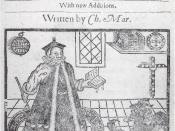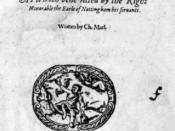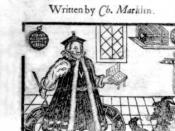Dr. Faustus Christopher Marlowe's play Dr. Faustus depicts the story of Dr. Faustus, a learned man in theology, who gives his soul to the Devil in exchange for twenty-four years of both pleasure and power. Faustus has faith in neither God nor Paradise; therefore he turns to black magic in order to fully enjoy life on earth. Mephistophilis, an accomplice to Lucifer, acts as Dr. Faustus' personal servant during his twenty-four year period of indulgence. In the beginning of Dr. Faustus, Dr. Faustus states "This night I'll conjure though I die therefore," (Scene I, Line 174) thus foreshadowing his eventual damnation and eternity of pain and suffering.
After Faustus makes a binding contract, stating that his soul belongs to Lucifer, he enjoys several years of unyielding pleasure. Later in the play, Faustus asks himself, "What art thou, Faustus, but a man condemned to die?" (Scene XI, Line 45).
Faustus realizes the mistake he has made by selling his soul to the Devil, and acknowledges that he is damned. Because he has no faith in God, he will suffer the severe consequences.
When it comes time for Faustus to die and serve eternity in hell with Lucifer, he exclaims "God forbade it indeed, but Faustus hath done it; for vain pleasure of twenty-four years hath Faustus lost eternal joy and felicity. I writ them a bill with mine own blood, the date is expired, the time will come, and [Lucifer] will fetch me." (Scene XIV, Line 43). Faustus once again recognizes his grave mistake and the price he must pay for his actions. For a mere twenty-four years of pleasure, he shall now be denied Paradise, and instead will endure unending pain and torment.
Marlowe's Dr. Faustus tells the classic tale of a short-sighted person selling his or her soul to the Devil in order for immediate reward and benefit. The tragic part of this play is that Faustus realized extremely early on in the play that he is condemning himself to eternal punishment. Within his mind, he rationalizes his decision by convincing himself that there is no God, Paradise, Devil, or Hell. However, he switches back and forth between recognizing reality and living in his fantasy world.





